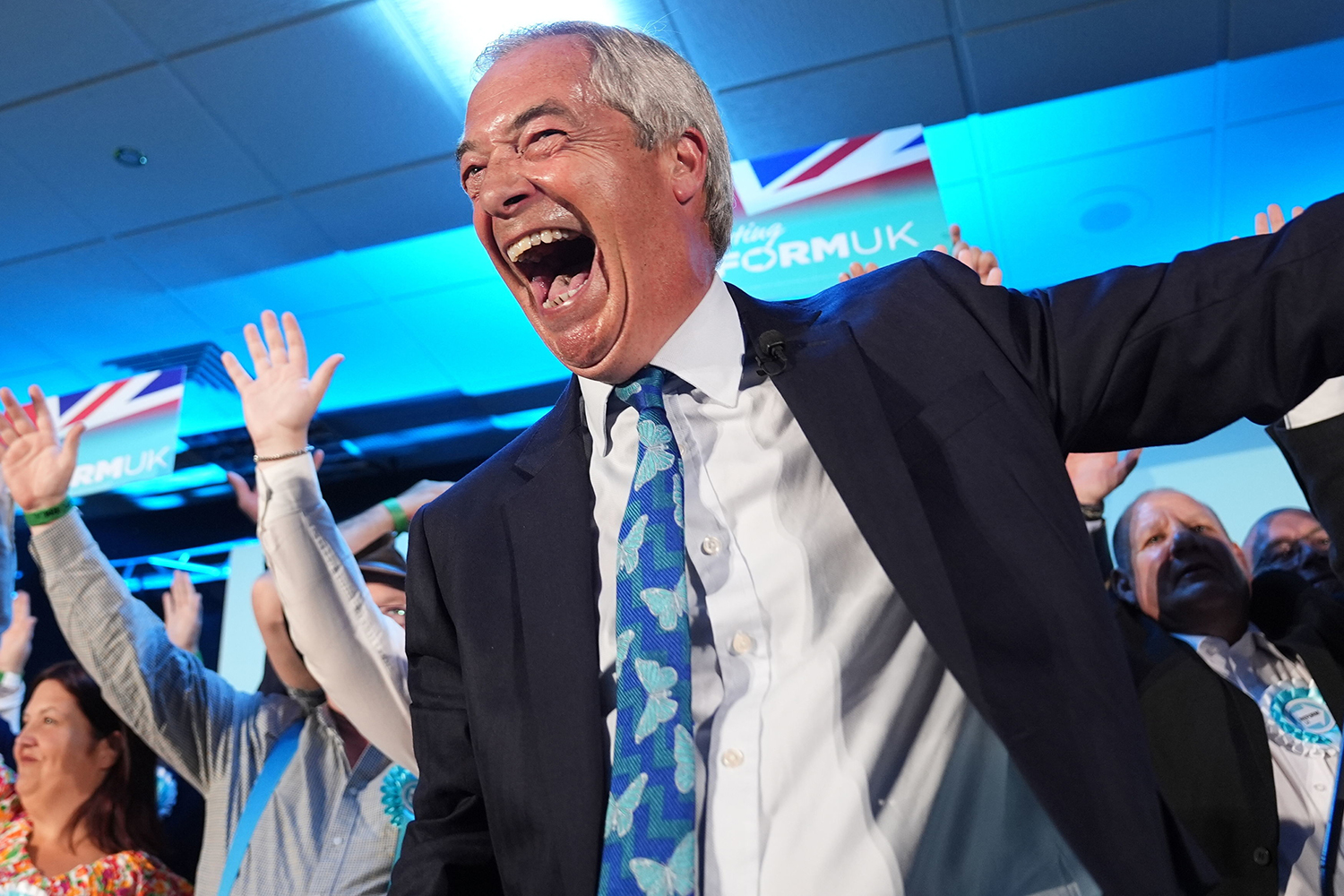What is Nigel Farage’s superpower? It is not a talent for government, because the old blowhard has never been so much as the parliamentary undersecretary for paper clips. It is not a record of sustaining support, because his various political startups have risen and fallen as erratically as a dodgy rollercoaster. He has been one of the most consequential politicians of our times, in part because he gets into the heads of mainstream politicians and lives there rent-free while he addles their senses.
The dangers posed to the older parties by Reform’s surge at Thursday’s elections include the significant peril that it will scare the wits out of them. We have experience of where this can lead. Fear of Faragism impelled David Cameron to blunder into his reckless and self-immolating promise to stage the Brexit referendum. Farage Derangement Syndrome took a grip on many Tories who should have known better when they put Boris Johnson into No 10, from where he won them an election in 2019, but at the steep price of sowing the seeds of the most abject defeat in their party’s long history in 2024.
Much to the maleficent satisfaction of Reform’s leader, the Conservatives have spent the subsequent 10 months expending all their nervous energy on agonising and squabbling about whether they should seek to ape, embrace or compete with him. This has made them look desperate and divided while bringing the Tories no closer to resolving their crisis of identity or clawing back respect from the electorate. Hundreds of lost council seats have been Kemi Badenoch’s reward for trying to chase his tail on immigration and net zero. The Tories have yet to learn that you don’t beat Nigel Farage by trying to be a tribute act to him.
Wherein lies a warning to Labour about how not to calibrate its response to what was a dismal night for Sir Keir Starmer and colleagues. “It’s not very pretty,” sighs one cabinet minister. The fragmentation of support for the older parties means that the British political map, which was painted almost entirely in red and blue in days of yore, now looks like Jackson Pollock has hurled his paintbrushes at it.
Labour’s defeat in the Runcorn and Helsby byelection is a humiliation for a party that won a parliamentary landslide less than a year ago and an eye-catching advance for Mr Farage. He will now be hoping to squat like an insomnia-inducing toad in the skulls of the Labour MPs representing the 88 other seats in which Reform was the runner-up at the general election last July. He was already camping in the brains of Labour strategists, especially those who think the outcome of the next election will be determined by the “hero voters” in what it has become a bit archaic to label “the red wall”. Remarking upon the risks of being mesmerised by Faragism, one veteran of the Blair and Brown cabinets says: “If we spend the next four years obsessing about losing, we’ll be petrified into a paralysis which will kill us.”
The more optimistic Labour strategists console themselves with the thought that Mr Farage will become the victim of his success. Previous vehicles for his ego, Ukip and the Brexit party, never established a base in local government. Reform has just gained more than 600 councillors, a triumph with a sting in its tail. Given the party’s spotty record at selecting candidates who are fit and proper to hold public office, it is not a bad bet that a chunky proportion of these standard bearers will turn out to have been busier expressing bampot opinions on social media than they have been thinking about how to make a success of running a council. On the campaign trail, Mr Farage promised to take an Elon Musk-style chainsaw to town, city and county hall spending. Let’s see how popular that is, murmur those Labour people who furtively express the opinion that Reform acquiring some power is a good thing because it will prove they can’t be trusted with it. We should also bear in mind Mr Farage’s record of being unwilling to coexist with anyone who might rival him for attention. Andrea Jenkyns, the defector from the Tories who has just been elected inaugural mayor of Greater Lincolnshire, is now Reform’s most powerful elected politician. She’s no-one’s idea of a blushing violet, and it has always turned ugly when anyone else in one of his outfits threatens to steal The Nigel’s limelight.
Hoping Reform will implode of its own accord is much too passive a strategy for those who clamour for a tack to the left, while the Blue Labour faction wants even more emphasis on competing for Reform-inclining voters. One of the many problems with trying to contain Faragism by leaning into it is that this repels other kinds of folk. Polling suggests that for every 2024 voter that Labour has shed to Reform, it has lost two or three to the centrist Lib Dems and the leftist Greens. Many Labour MPs worry that No 10 is already so preoccupied with Reform-switchers that it appears oblivious to the voters jumping ship from the other side of Labour’s listing boat.
It is also important to grasp that Reform supporters are not all the same. There’s a hardcore of Farage-followers who will never be biddable to Labour. The additional support Reform is attracting at the moment comes from more swingy voters discontented about living standards, the condition of public services and blunders made by the government. A member of the cabinet remarks: “With the people we’ve lost to Reform, it is about trust and winter fuel payments and things like that. The disillusionment with politics-as-usual is something we have to recognise and address, but that’s really hard in government because you look like the establishment.”
Before it is anything else, the Reform surge is a howl of fury with the state of things from voters who feel repeatedly let down by mainstream politicians. The answer to that is not to become more like Reform: it is to be more urgent and convincing about making reforms. Being the change that it promised to be is the only viable path to recuperation for Labour. The best antidote to the politics of grievance is good government. Team Starmer won’t deliver that if they allow Nigel Farage to live in their heads.
Newsletters
Choose the newsletters you want to receive
View more
For information about how The Observer protects your data, read our Privacy Policy

